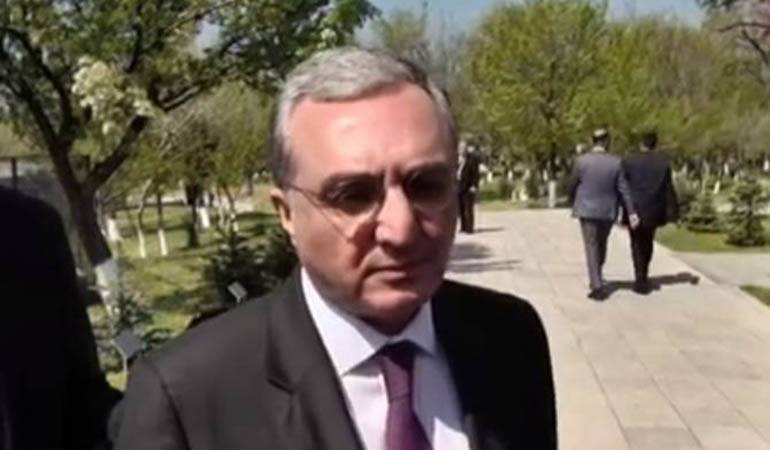Briefing of the Foreign Minister of Armenia Zohrab Mnatsakanyan with journalists at Tsitsernakaberd Memorial
24 April, 2019Zohrab Mnatsakanyan. The most important message is that the determination to restore justice never disappears, especially when the justice is denied.
Question. Mr. Mnatsakanyan, after 100 years, how would you explain the denialism of Ankara?
Zohrab Mnatsakanyan. This is the most difficult question, because one can’t understand to which extend it is impossible to take that step, to which extend facing its own history, having that courage, that responsibility towards humanity is an obstacle for the authorities. It's the biggest problem, the biggest question: if only anyone has the answer... But this is also a message to overcome the genocide, we, as a nation, have overcome the genocide.
Question. Mr. Minister, the process of international recognition seems to have stopped.
Zohrab Mnatsakanyan. How can it stop? The process of recognition of the Armenian Genocide is not only a step towards restoring justice for us, but also a step towards the prevention of genocides because it bears the message that impunity is not going to work.
Question. Taking into consideration the unprecedentedly high image of Armenia, its legitimacy, is it possible that Yerevan will start a new process of reconciliation and force Ankara to open its borders?
Zohrab Mnatsakanyan. Unfortunately, I am convinced that you hear and follow everything being voiced by the official Ankara, and those messages are not very encouraging, moreover, they are subjected to criticism.
Question. Can we say that the the recognition of the Armenian Genocide is a precondition in this regard?
Zohrab Mnatsakanyan. We never said that this is a precondition.
Question. Mr. Mnatsakanyan, it seems that the Netherlands has adopted a bill in which the denial of genocides is criminalized, but there was no mentioning about the Armenian Genocide.
Zohrab Mnatsakanyan. Frankly speaking, I do not have such information, but the fight against denial has been and remains one of the greatest priorities for us. And it has already been 21 years that we advance the agenda of genocide prevention on the international platforms. Prevention of genocide is an international obligation. And strengthening those tools, those capacities within the international system, developing legal and business opportunities is a constant challenge, as well as a function. It is a continuous process and we will consistently work in that direction.
On December 9, the Third Global Forum Against the Crime of Genocide was held in Yerevan. You know that it was by Armenia’s initiative that the 9th of December was embodied on the UN agenda as the International Day of Commemoration and Dignity of the Victims of the Crime of Genocide and of the Prevention of this Crime. This was Armenia’s initiative, as well. You know that Armenia has been permanently renewing the resolutions which are developing the legal framework for international cooperation towards prevention. And this is a continuous process that never stops.
Every time the humanity stands and says "Never again", however that "Never again" happens again. We are directly obliged, we know the price of genocide, we know how hard it is. It is already the fourth-fifth generation of our nation that carries the pain, the tragedy. And it brings up the most important message that denied and rejected justice can not disappear, impunity can not be accepted.
Question. According to information coming from Baku, the meeting between Aliyev and Pashinyan will be held in Washington. Was this too hasty or it is a lie?
Zohrab Mnatsakanyan. Excuse me, no information has been announced on Aliev-Pashinian meeting. As you know, we met in Moscow on April 15 and discussed how we are going to implement the next step and set the approximate date and place. Now we have discussed. This applies to both the Co-Chairs and the two Ministers. Following the meeting, each of us should clarify the dates and only after that we will announce about it. You know, the meetings take place in different capitals, including the capitals of the Co-Chair countries. All the options are open. The right way is that we all come to an agreement and only after announce about it jointly.
Question. Mr. Minister, Zakharova states that the version based on the proposals of Russia is currently on the table of negotiations, supposedly it’s the Lavrov's plan.
Zohrab Mnatsakanyan. What we have indicated in the statement actually expresses what we have. I had no need for further comments because everything was reflected in the document, which we have agreed together and this statement is our common property. It states everything: that we have discussed different approaches and positions of the sides. This is natural, this is a fact. But we don't discuss any document today, at this stage.


